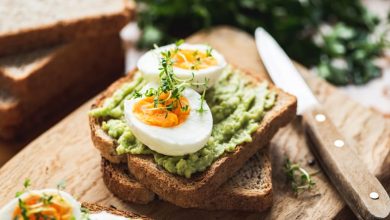Should We All Be Doing More Medicine Ball Slams?

Medicine ball slams may seem daunting. But once you get the hang of the exercise, it might become your new favorite move to try out at the gym. That’s because besides being an effective way to build strength, medicine ball slams are actually kind of fun. And if you’re having a stressful day, you may find that blasting out a few medicine ball slams is even low-key therapeutic.
Of course, the potential performance benefits of training with a medicine balltg are also a compelling reason to give medicine ball slams a try. Plus, medicine balls are relatively inexpensive, and often found at many commercial gyms and local community fitness centers. So even though moves like medicine ball slams might look intimidating, they might be easier than you might think. But if you’re not sure where to begin, we put together this simple guide for how to do medicine ball slams.
What Are the Benefits of Medicine Ball Slams
Some gym equipment can get a bad reputation for being complicated or confusing. But medicine balls are a simple and completely versatile tool that can be used by people of all different abilities. You can hold them while you perform squats or lunges, or you can use them for more explosive movements, like medicine ball slams.
Medicine ball slams, as explained in our guide below, are a total body exercise, incorporating the muscles of the upper body, back, lower body, and core, per the International Journal of Exercise Science. Depending on how they’re utilized into a circuit or interval-style training, they can also help improve aerobic conditioning and overall cardiovascular health.
They can even aid in preparing or potentiating your muscles for other activities. A recent, very small study from the Journal of Strength and Conditioning Research found that swimmers who performed three sets of five medicine ball slams, recovered for four minutes, then swam 50 meters in an all-out effort swam almost 2 percent faster. This suggests that medicine ball slams could be a quick way to not just warm up your upper body, but to prime the muscles for optimal performance.
One note: medicine ball slams can sometimes be confused with medicine ball throws. The latter, however, can be performed in a variety of different setup positions like against a wall, in some rotational throws. Traditional overhead medicine ball slams, on the other hand, always involve lifting the ball straight overhead, then pushing it with force to the ground. Both types of exercises have benefits, but we’re focusing on slams in this guide.
Intrigued enough to try it out for yourself? Here’s a quick primer on how to do a medicine ball slam. As always, be sure to plan to do a warm-up before jumping right in. If you’re new to the move, or to exercise in general, consider talking to your doctor before attempting medicine ball slams to ensure you can perform them safely.
How to Do a Medicine Ball Slam
- Start by moving your feet about shoulder to hip width apart.
- Standing tall, hold the medicine ball centered between your hands.
- With control, lift the medicine ball overhead, with arms extended.
- Slam the ball forcefully down towards the ground.
- Hips should lower down and move back behind you, with knees slightly bent.
- Catch the ball back in the center, or pick it up from the floor.
- Reset back to the starting position.
Try not to let the shoulders round excessively, or arch the back. And as an important reminder, be mindful of the weight used.
You might be tempted to use a heavy weight at the get-go but safety is priority, so use a light weight at first. Check out our overview of how to pick the right weight, here, but consider starting with about four to six pounds. Take things slow, and try the movement with a little bit less force than you might think is necessary initially. After all, you wouldn’t want the ball to bounce back faster than anticipated and cause an accident (FYI, those injuries are not pretty!). Before long, you’ll feel more confident in the move and your form — and you’ll be reaping the benefits.
Jade Esmeralda, MS, CSCS, is a Staff Writer, Health & Fitness. A life-long martial artist and dancer, Jade has a strong passion for strength & conditioning, sports science, and human performance. She graduated with a Master of Science degree in Exercise Science and Strength and Conditioning from George Washington University.




